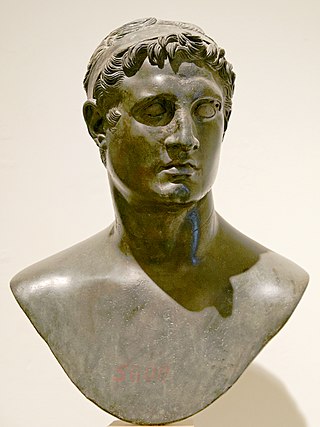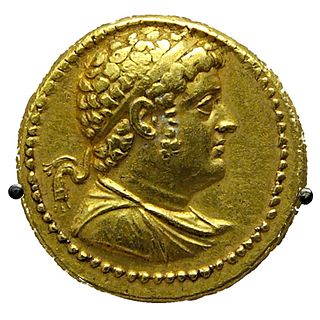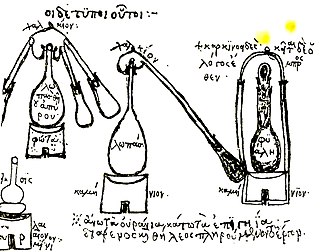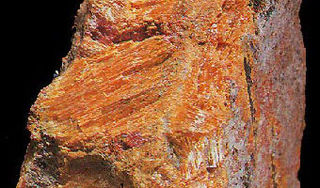
Claudius Ptolemy was an Alexandrian mathematician, astronomer, astrologer, geographer, and music theorist, who wrote about a dozen scientific treatises, three of which were of importance to later Byzantine, Islamic, and Western European science. The first is the astronomical treatise now known as the Almagest, although it was originally entitled the Mathēmatikē Syntaxis or Mathematical Treatise, and later known as The Greatest Treatise. The second is the Geography, which is a thorough discussion on maps and the geographic knowledge of the Greco-Roman world. The third is the astrological treatise in which he attempted to adapt horoscopic astrology to the Aristotelian natural philosophy of his day. This is sometimes known as the Apotelesmatika but more commonly known as the Tetrábiblos, from the Koine Greek meaning "Four Books", or by its Latin equivalent Quadripartite.

The Ptolemaic dynasty, also House of Ptolemy, or Lagid dynasty, was a Macedonian Greek royal dynasty which ruled the Ptolemaic Kingdom in Ancient Egypt during the Hellenistic period. Their rule lasted for 275 years, from 305 to 30 BC. The Ptolemaic was the last dynasty of ancient Egypt.

Ptolemy II Philadelphus was the pharaoh of Ptolemaic Egypt from 284 to 246 BC. He was the son of Ptolemy I, the Macedonian Greek general of Alexander the Great who founded the Ptolemaic Kingdom after the death of Alexander, and Queen Berenice I, originally from Macedon in northern Greece.

Ptolemy IV Philopator was the fourth pharaoh of Ptolemaic Egypt from 221 to 204 BC.
Berenice is the Ancient Macedonian form of the Attic Greek name Φερενίκη Pherenikē, which means "bearer of victory" from Ancient Greek φέρω (pherō) 'to bear', and νίκη (nikē) 'victory'. Berenika, priestess of Demeter in Lete ca. 350 BC, is the oldest epigraphical evidence. The name also has the form Bernice.

30°54′N31°7′E
Ptolemy is a name derived from Ancient Greek. Common variants include Ptolemaeus (Latin), Tolomeo (Italian) and Talmai (Hebrew).

Aristarchus of Samothrace was an ancient Greek grammarian, noted as the most influential of all scholars of Homeric poetry. He was the head librarian of the Library of Alexandria and seems to have succeeded his teacher Aristophanes of Byzantium in that role.

Agathos Daimon originally was a lesser deity (daemon) of classical ancient Greek religion and Graeco-Egyptian religion. In his original Greek form, he served as a household god, to whom, along with Zeus Soter, libations were made after a meal. In later (post-)Ptolemaic antiquity he took on two partially distinct roles; one as the Agathos Daimon a prominent serpentine civic god, who served as the special protector of Alexandria. The other as a genus of serpentine household gods, the Agathoi Daimones, individual protectors of the homes in which they were worshipped.

Zosimos of Panopolis was a Greco-Egyptian alchemist and Gnostic mystic who lived at the end of the 3rd and beginning of the 4th century AD. He was born in Panopolis, and flourished ca. 300. He wrote the oldest known books on alchemy, which he called "Cheirokmeta," using the Greek word for "things made by hand." Pieces of this work survive in the original Greek language and in translations into Syriac or Arabic. He is one of about 40 authors represented in a compendium of alchemical writings that was probably put together in Constantinople in the 7th or 8th century AD, copies of which exist in manuscripts in Venice and Paris. Stephen of Alexandria is another.

Serapis or Sarapis is a Graeco-Egyptian God. The cult of Serapis was created during the third century BC on the orders of Greek Pharaoh Ptolemy I Soter of the Ptolemaic Kingdom in Egypt as a means to unify the Greeks and Egyptians in his realm.

Faiyum is a city in Middle Egypt. Located 100 kilometres southwest of Cairo, in the Faiyum Oasis, it is the capital of the modern Faiyum Governorate. Originally called Shedet in Egyptian, the Greeks called it in Koinē Greek: Κροκοδειλόπολις, romanized: Krokodilópolis, and later Medieval Greek: Ἀρσινόη, romanized: Arsinoë. It is one of Egypt's oldest cities due to its strategic location.
Ptolemy was a Greek mathematician, astronomer, geographer and astrologer.
The history of cartography refers to the development and consequences of cartography, or mapmaking technology, throughout human history. Maps have been one of the most important human inventions for millennia, allowing humans to explain and navigate their way through the world.

The Ptolemaic Kingdom or Ptolemaic Empire was an Ancient Greek state based in Egypt during the Hellenistic period. It was founded in 305 BC by Ptolemy I Soter, a companion of Alexander the Great, and ruled by the Ptolemaic dynasty until the death of Cleopatra VII in 30 BC.

The Canal of the Pharaohs, also called the Ancient Suez Canal or Necho's Canal, is the forerunner of the Suez Canal, constructed in ancient times and kept in use, with intermissions, until being closed for good in 767 AD for strategic reasons during a rebellion. It followed a different course from its modern counterpart, by linking the Nile to the Red Sea via the Wadi Tumilat. Work began under the pharaohs. According to Darius the Great's Suez Inscriptions and Herodotus, the first opening of the canal was under Persian king Darius the Great, but later ancient authors like Aristotle, Strabo, and Pliny the Elder claim that he failed to complete the work. Another possibility is that it was finished in the Ptolemaic period under Ptolemy II, when engineers solved the problem of overcoming the difference in height through canal locks.

Agathodaemon was an alchemist in late Roman Egypt, known only from fragments quoted in medieval alchemical treatises, chiefly the Anepigraphos, which refer to works of his believed to be from the 3rd century. He is primarily remembered for his various descriptions of elements and minerals, most particularly his descriptions of a method of producing silver, and of a substance he had created, which he called a 'fiery poison', and which, judging by his account, was arsenic trioxide, a highly toxic amphoteric oxide.
Agathodaemon of Alexandria was a Greek or Hellenized cartographer, presumably from Alexandria, Egypt, in late Antiquity, probably in the 2nd century A.D.
Lysimachus is an ancient and modern Greek name meaning "scattering the battle". The female equivalent of the name is Lysimache.











